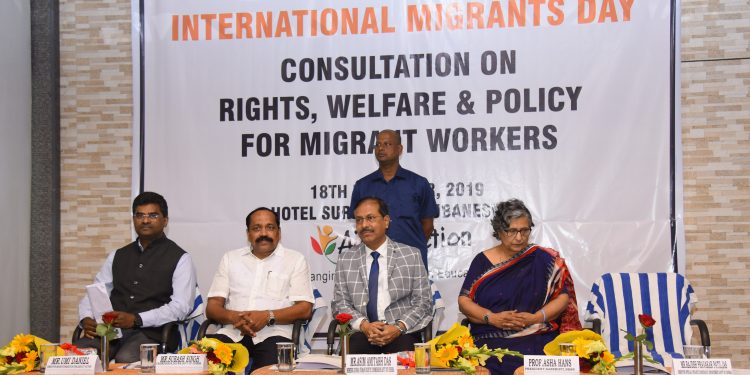Bhubaneswar: Migration of labourers has been a cause of concern as 1,05,363 people in the state have been registered under the Interstate Migrant Workers Act, 1979. Odisha is one of the key source states for migrant labourers moving to Andhra Pradesh, Chhattisgarh, Gujarat and Telangana.
As per the Economic Survey of India 2017, around 9 million people travel to interstate destinations as informal workers every year.
However, a large number of wage earners and their families migrating within and outside Odisha go unregistered, unnoticed and untracked. The growing issues of migrant labourers are a huge concern for the government as well as civil society organisations in the state.
A consultation on ‘Rights, Welfare and Policies for Migrant Workers’ was organised here, Wednesday, by Aide et Action. Participating in the consultation, Umi Daniel, Director-Migration and Education of Aide et Action, provided an overview of labour migration in India and Odisha. “Migration happens due to dearth of better quality of life and also due to distress,” said Umi. He also highlighted the situation of distress migration in western part of Odisha. He also stressed upon enforcement of existing laws and policies like Inter-state Migrant Workers’ Act, 1979 and the newly formed Occupational Safety, Health and Working Conditions (OSH) Code of 2019.
Subash Singh, chairperson of Odisha Building and Other Construction Workers’ Welfare Board, talked about registration of migrant workers and about ensuring their security. He deliberated upon safe migration where the focus must be given to implementation of laws. “Because, Odisha happens to be one of those states which are having two boards meant for unorganised workers and migrant workers and many safety mechanisms in place,” Singh said. He said that in 2019 over 50 middlemen have been arrested by the district administrations. Odisha is the first state to have registered migrant workers under the Building and Other Construction Workers Welfare Board. Around 29 lakh workers of different sectors have been registered with the board so far, he added.
Rajesh Pravakar Patil, Director Special Project, Panchayati Raj & Drinking Water department, spoke about the upcoming changes in National Rural Employment Guarantee Act, (NREGA), wherein the number of working days would be increased from 100 to 200 days along with an enhancement in the wage as well. The concept of INRM (Integrated Natural Resource Management) has been adopted in this new model to maintain sustainability and efficient service delivery in 20 intensive blocks of four migration-prone districts of the state. He talked about including stakeholders’ rights from gram panchayat level to district administration level to create Shramik Sangha, Sahayata Kendra and having clusters to look into livelihood creation at the base. This apart, timely payment shall be ensured and for the same a corpus fund of Rs 500 crore has been created.






































